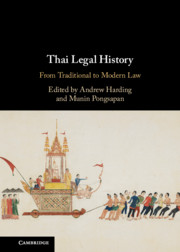Book contents
- Thai Legal History
- Additional material
- Thai Legal History
- Copyright page
- Contents
- Tables
- Contributors
- Preface
- Chronology
- Table of Cases
- Legislation, Constitutional Provisions, and Treaties
- Abbreviations
- 1 Introduction
- 2 Thai Legal History
- Part I Traditional Law and its Modern Resonances
- Part II Foreign Influence and the Reform Period
- Part III Constitutional Conflicts 1932–2017
- 15 The Thai-Style Democracy in Post-1932 Thailand and Its Challenges
- 16 Permutations of the Basic Structure
- 17 The 1991–1992 Judicial Crisis
- 18 Without Account
- Glossary
- Index
18 - Without Account
Coups, Amnesties and Justice in Thailand
from Part III - Constitutional Conflicts 1932–2017
Published online by Cambridge University Press: 28 May 2021
- Thai Legal History
- Additional material
- Thai Legal History
- Copyright page
- Contents
- Tables
- Contributors
- Preface
- Chronology
- Table of Cases
- Legislation, Constitutional Provisions, and Treaties
- Abbreviations
- 1 Introduction
- 2 Thai Legal History
- Part I Traditional Law and its Modern Resonances
- Part II Foreign Influence and the Reform Period
- Part III Constitutional Conflicts 1932–2017
- 15 The Thai-Style Democracy in Post-1932 Thailand and Its Challenges
- 16 Permutations of the Basic Structure
- 17 The 1991–1992 Judicial Crisis
- 18 Without Account
- Glossary
- Index
Summary
Between 1932 and 2018, there have been twelve successful – meaning the coup makers seized power – coups in Thailand. Each time, the coup makers have protected themselves by passing an amnesty, in the new constitution promulgated by the dictator or junta, in a stand-alone law, and sometimes both. Each amnesty article or law has retroactively legalized the coup in question and protected the coup-makers from possible prosecution or other sanction. In each instance, the amnesty has turned rebellion into an administrative action and legalized the extrajudicial seizure of power from the people. Over time, the repeated amnesties have institutionalized the dispossession of democracy and the people’s role in the Thai polity. This chapter traces the legal and political history of the repetition of the use of amnesty as a way to understand one aspect of the foreclosure of accountability and the production of impunity for the military. What legal and social political work does each amnesty perform individually, and how do they function as a history? What language and aspects of amnesty law have remained consistent over different iterations of the amnesties, and what new legal manoeuvres have been introduced? What legal and political challenges to amnesty have been made, and which remain unthinkable? Framed by comparison with legal amnesties for coups in other countries, this chapter reflects on what the history and repetition of coup amnesties means for the possibility of justice in Thailand. The chapter concludes with a reflection on the most recent coup, 22 May 2014 coup by the National Council for Peace and Order, the constitutional amnesty provisions passed, and the possibility of undoing them following a future democratic transition.
Keywords
- Type
- Chapter
- Information
- Thai Legal HistoryFrom Traditional to Modern Law, pp. 265 - 277Publisher: Cambridge University PressPrint publication year: 2021



